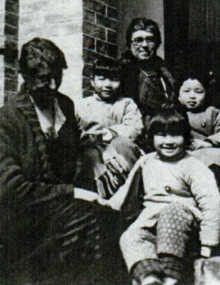Lily Haass
| Lillian Katherine Haass | |
|---|---|

Lillian Haass (left) and Mary Dingman (right) with Zuo family children in Changsha, 1923
|
|
| Born |
26 November 1886 Merton, Wisconsin. US |
| Died | 7 January 1964 (aged 77) Los Angeles, California, US |
| Nationality | American |
| Other names | Chinese: 夏秀蘭, Xia Xiulan |
| Occupation | YWCA secretary |
| Known for | Industrial work in China |
Lillian Katherine Haass (Chinese: 夏秀蘭, Xia Xiulan 26 November 1886 – 7 January 1964) was a YWCA worker in Shanghai, China, between 1914 and 1945. She led efforts to educate Chinese women to become leaders among industrial workers.
Lily K. Haass was born in Merton, Wisconsin. She graduated from the Whitewater State Teachers college and the University of Wisconsin. She moved to China in 1914 and worked as an American YWCA secretary in Beijing. Haass wanted social and economic justice for Chinese factory workers, but as a Christian believed in peaceful, cooperative reform. When Maud Russell came to China they worked together in Beijing in 1919 and became close friends. Haass told Russell about the National Christian Council (NCC), which was helping arrange for Chinese and foreign Christians in Shanghai to work on World Student Christian Federation (WSCF) industrial reform.
In 1920–21 Haass was acting head of the Social Science department of Princeton-in-Peking. Haass worked with Agatha Harrison in the YWCA Industrial Department. In November 1923 Haass invited Russell to travel with her on furlough the next year. They would take the Orient Express across the Soviet Union and then study in a seminar held by Sherwood Eddy at the London School of Economics (LSE). Russell had already made plans to visit India, and had to refuse. The women took different routes, but met in London at the end of March 1924 and went on to Birmingham to attend the international Conference on Christian Politics, Economics and Cirizenship.
By the mid-1920s it was becoming clear that to remain a relevant organization in China the YWCA had to pay more attention to the women in rural and industrial occupations and less to the middle classes. In June 1925 Haass, who had graduated from her LSE course, took over as head of the Chinese Industrial Department from Mary Dingman. Haass led the combined efforts of the YWCA and the NCC in industrial reform. The YWCA soon gave up trying to cooperate with employers, who refused to make any improvements to working conditions. Haass argued unsuccessfully with Ding Shujing in late 1927 over the direction of the YWCA industrial program. Lily Haass wrote to the World YWCA headquarters to argue her case. She thought the YWCA had to start to work with the "masses" or else go home.
...
Wikipedia
